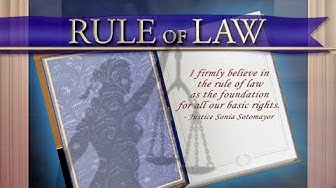The rule of law is the principle whereby all members of a society (including those in government) are considered equally subject to publicly disclosed legal codes and processes. The rule of law implies that every person is subject to the law, including people who are lawmakers, law enforcement officials, and judges. Under the rule of law all persons, institutions, and entities are accountable to laws that are:
- Publicly promulgated
- Equally enforced
- Independently adjudicated
- Consistent with international human rights principles.
All government officers of the United States, including the President, all members of Congress, federal judges, and state legislators and judges, pledge first and foremost to uphold the Constitution. These oaths affirm that the rule of law is superior to the rule of any human leader.
The courts play an integral role in maintaining the rule of law, particularly when they hear the grievances voiced by minority groups or by those who may hold minority opinions. Equality before the law is such an essential part of the American system of government that, when a majority, whether acting intentionally or unintentionally, infringes upon the rights of a minority, the Court may see fit to hear both sides of the controversy in court.

